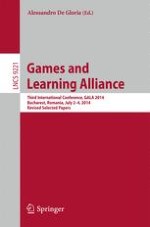2015 | Buch
Games and Learning Alliance
Third International Conference, GALA 2014, Bucharest, Romania, July 2-4, 2014, Revised Selected Papers
herausgegeben von: Alessandro De Gloria
Verlag: Springer International Publishing
Buchreihe : Lecture Notes in Computer Science
